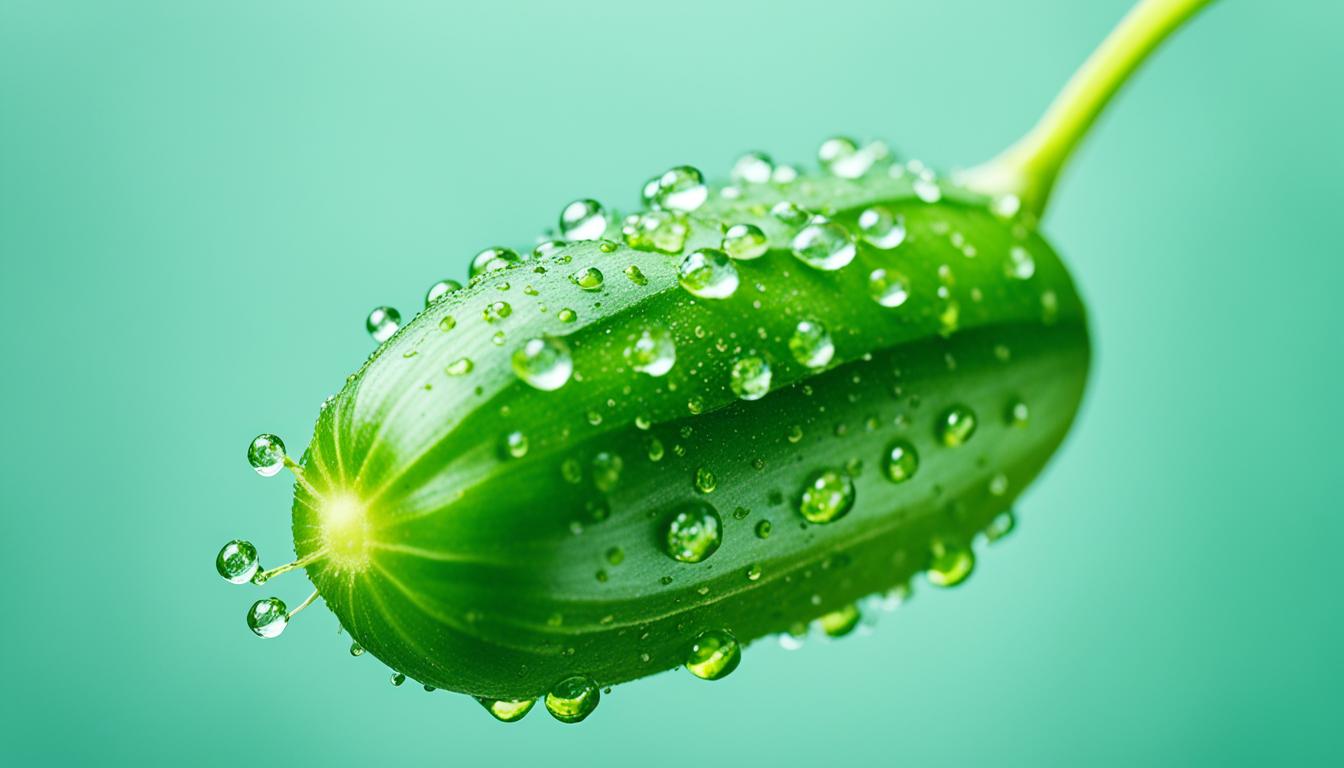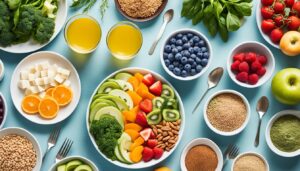Cucumbers – those crispy, refreshing green wonders that grace our plates in salads and sandwiches. Are they fruits or vegetables? This question might surprise some. Let’s solve this mystery and understand cucumbers better.
Key Takeaways
- Cucumbers are botanically classified as fruits due to their origin from the flower of the cucumber plant.
- In the culinary world, cucumbers are commonly considered vegetables due to their prevalent use in savory dishes.
- Cucumbers are versatile and can add a refreshing crunch to a variety of culinary creations.
- They are packed with essential vitamins, minerals, and antioxidants, providing numerous health benefits.
- Understanding the dual nature of cucumber classification allows us to appreciate their nutritional value and culinary potential.
The Botanical Classification of Cucumbers
Cucumbers have a unique place in both science and our kitchens. Scientifically, they are fruits because they come from the flower’s ovary and have seeds. This fact puts them in the Cucurbitaceae family with melons and squash.
Knowing how cucumbers are classified helps us understand their growth and role. They start by flowering. After pollination, the ovary turns into the cucumber we eat. Inside, we find seeds, showing it’s truly a fruit.
Yet, we don’t always think of cucumbers as fruits in the kitchen. We use them as vegetables in savory dishes, salads, and even pickles. This shows how flexible cucumbers are in cooking.
“By understanding the botanical classification of cucumbers, we can appreciate their unique journey from a flower’s ovary to a delicious and refreshing fruit.”
Cucumbers straddle the line between fruit and vegetable in an interesting way. Botanically, they are fruits because of their features. But in cooking, we treat them as vegetables. This duality shows how complex food classification can be.
Now, we’re ready to dive into how cucumbers are used in cooking. Let’s explore their delicious and healthy possibilities.
Botanical Classification of Cucumbers
| Botanical Classification | Definition |
|---|---|
| Fruit | Develops from the ovary of a flower and contains seeds. |
| Vegetable | Commonly used in savory dishes and salads. |
The Culinary Use of Cucumbers
Cucumbers are often seen as vegetables in the kitchen, even though they are technically fruits. They have a mild taste and a refreshing crunch. This makes them great for a variety of savory dishes. They can make salads tastier and salsas more tangy.
Cucumbers in Salads
Salads are one of the best ways to enjoy cucumbers. Their crunchiness and light taste fit well with many ingredients. Cucumbers can make a dish feel fresh, whether it’s a simple cucumber and tomato salad or something fancier.
Cucumbers in Sandwiches
In sandwiches, cucumbers add a nice, crunchy touch. They go well with other fillings, like proteins, cheeses, and spreads. Thin slices of cucumber can make your sandwich more refreshing.
Pickling Cucumbers
Pickling cucumbers have a thicker skin, which is ideal for making pickles. When mixed with vinegar and spices, you get tangy and tasty pickles. These can be enjoyed in many ways, such as a side dish or a snack. Try different recipes to find your favorite.
Refreshing Cucumber Drinks
Cucumbers can also be used in drinks. Mix them with water, lime juice, and a bit of sweetness for an agua fresca. Or, add cucumber slices to water for a light drink. Their cooling effect is perfect for summer.
Chilled Cucumber Soups
For something different, try making chilled cucumber soups. When blended with yogurt, herbs, and citrus, they’re refreshing. They make a great appetizer or light lunch during hot weather.
“Cucumbers bring a refreshing crunch and subtle taste to various savory dishes, making them a versatile ingredient in the kitchen.”
When using cucumbers in the kitchen, be bold and try new things. Their mildness and texture can support many flavors. Cucumbers can improve salads, sandwiches, and pickles. They’re a useful ingredient for any cook.
| Cucumber Recipe | Description |
|---|---|
| Cucumber and Tomato Salad | A classic summer salad that combines the crispness of cucumbers with the sweetness of tomatoes and the tanginess of vinaigrette. |
| Thai Cucumber Salad | A refreshing salad with cucumbers, red onion, cilantro, and a zesty dressing featuring lime juice, soy sauce, and sugar. |
| Cucumber and Avocado Sushi Rolls | A delicious sushi roll filled with cucumber, avocado, and other ingredients of your choice, wrapped in seaweed and sushi rice. |
| Cucumber, Mint, and Feta Cheese Salad | A light and flavorful salad that combines cucumbers, fresh mint, crumbled feta cheese, and a lemony dressing. |
The Nutritional Value of Cucumbers
Cucumbers are tasty and healthy. You can eat them in many ways. They give a refreshing crunch and many important nutrients.
Here are some impressive cucumber nutrition facts:
- Low in calories: Cucumbers are a guilt-free snack, as they are low in calories and can help with weight management.
- High in water content: With a water content of approximately 95%, cucumbers keep you well-hydrated.
- Dietary fiber: They are a good source of fiber, helping in digestion and weight control.
- Rich in vitamins: Full of vitamins like K and C, they support bone health and boost immunity.
- Mineral powerhouse: They have potassium for blood pressure and magnesium for muscle relaxation.
Cucumbers are packed with benefits. They help with hydration, immune health, and bones.
The Health Benefits of Cucumbers
In addition to their nutritional value, cucumbers offer a range of health benefits:
Cucumbers keep you hydrated. Great for summer or after exercising.
They have antioxidants which reduce inflammation. Eating cucumbers can boost your digestion and skin health. They also help in body detox.
Next time, choose cucumbers for a healthy snack. They’re crunchy, nutritious, and good for your health.
Types of Cucumbers and Their Uses
There are many types of cucumbers, each with its own special traits and uses. Some are perfect for fresh salads while others are ideal for making tangy pickles. Knowing the differences helps you pick the right one for your cooking.
1. Slicing Cucumbers
Slicing cucumbers, like the English cucumber, are great for eating raw. They’re usually longer with thin skin, so they’re easy to cut for salads or sandwiches. They’re crispy and have a mild taste, making your meal refreshing.
2. Pickling Cucumbers
Pickling cucumbers are your go-to for homemade pickles. Take Kirby cucumbers as an example; they’re small and have tough skin. This means they stay crunchy even when pickled. Use them to make pickles or to add crunch to sandwiches.
3. Specialty Cucumbers
There are also special types of cucumbers. They vary in shape, size, and color, each offering different flavors and textures. For instance, lemon cucumbers are small, round, and yellow with a mild, tangy taste. They’re great in salads or as a tasty, healthy snack.
| Cucumber Variety | Characteristics | Best Uses |
|---|---|---|
| Slicing Cucumbers (English Cucumber) | Long, thin skin, crispy texture | Fresh in salads or sandwiches |
| Pickling Cucumbers (Kirby Cucumber) | Small, tough skin, retains crunch | Pickling or added crunch in sandwiches |
| Specialty Cucumbers (Lemon Cucumber) | Small, round, yellow color, tangy taste | Addition to salads or as a snack |
Exploring the many types of cucumbers can make your food more exciting. Whether it’s a crisp cucumber salad or delicious homemade pickles, cucumbers add versatility to dishes. They’re a fantastic ingredient that enhances any meal.
Health Benefits of Cucumbers
Cucumbers add a refreshing touch to meals and boost your health. They’re full of water, have few calories, and are rich in vital vitamins and minerals. These help you feel good overall.
Cucumbers are great for staying hydrated, with 96% water content. They’re perfect for hot days or when you need a refreshing snack. This makes them an ideal choice for keeping thirst at bay.
They’re also full of antioxidants, which reduce inflammation and help fend off chronic diseases. These antioxidants, like flavonoids and tannins, fight harmful free radicals. This promotes cell health.
Cucumbers have key vitamins and minerals. For instance, Vitamin K ensures good blood clotting and bone health. There’s also Vitamin C for immune support and potassium for heart and fluid balance.
The fiber in cucumbers aids in digestion. It helps with regular bowel movements and wards off constipation. Eating cucumbers supports a healthy gut and boosts digestive wellness.
In summary, cucumbers hydrate, are low in calories, and packed with antioxidants, vitamins, minerals, and fiber. They make meals delicious and support your health.
Nutritional Profile of Cucumbers
| Nutrient | Amount per 100g |
|---|---|
| Calories | 15 |
| Water | 96g |
| Vitamin K | 16.4 mcg |
| Vitamin C | 2.8 mg |
| Potassium | 147 mg |
| Fiber | 0.5 g |
Cucumbers are low in calories and mostly water. This makes them great for healthy weight management. They offer key vitamins and minerals needed for good health.
Growing and Harvesting Cucumbers
Growing cucumbers by yourself is rewarding. It lets you enjoy very fresh produce straight from your garden. You can grow cucumbers successfully, no matter if you have a large backyard or just a small balcony, with some basic tips and techniques.
Choosing the Right Location and Soil
Pick a sunny spot for your cucumber plants. Cucumbers need a lot of sunlight, so find a place that gets 6-8 hours of direct sunlight daily.
Then, get the soil ready. Cucumbers like soil that is rich in nutrients and drains well. Begin by loosening the soil and clearing any weeds or trash. Add compost or aged manure to make the soil richer and help it hold moisture.
Planting Cucumber Seeds
Planting at the right time is key. Wait until there’s no risk of frost and the soil is over 60°F (15°C). This usually happens in late spring or early summer.
Plant the seeds 1 inch deep and 2-3 feet apart. This gives the vines space to grow. If space is tight, try growing your cucumbers up on trellises or stakes.
After planting, water the soil gently to start germination. Keep the soil moist, but don’t overdo it. Too much water can cause root rot.
Caring for Cucumber Plants
Cucumbers need a lot of water to grow well. Water deeply once or twice a week, so the soil stays moist. Cucumbers may need more water when it’s very hot and dry.
Using mulch around the plants helps keep moisture in and stops weeds. It also keeps cucumbers clean and reduces disease risks.
Harvesting Cucumbers
Picking cucumbers at the right time matters for the best taste and texture. Depending on their type, most cucumbers are ready in 50-70 days after planting.
Look at the size and color to see if they are ready. For slicing types, pick when they are 6-8 inches long. Pickling types should be a bit smaller.
To pick them, hold the cucumber near its base and twist it off. Don’t pull it; that could harm the plant.
Enjoying the Fruits of Your Labor
With care, you can have lots of cucumbers all season. They are great in salads, sandwiches, and drinks.
| Cucumber Variety | Days to Harvest | Best Uses |
|---|---|---|
| English (Slicing) Cucumbers | 50-70 days | Salads, sandwiches, garden-fresh snacking |
| Pickling Cucumbers | 45-55 days | Pickling, relishes, canning |
| Lemon Cucumbers | 65-70 days | Salads, garnishes, unique culinary creations |
Growing cucumbers asks for patience and consistent effort. If you face any hurdles at first, don’t give up. Every growing season is a new chance to improve your gardening skills and enjoy a bounty of cucumbers.
Creative Ways to Use Cucumbers
Cucumbers are more than just a salad ingredient. Their mild taste and refreshing crunch offer a fun twist to many dishes. This makes them a key player in your cooking arsenal.
Want to try something new with cucumbers? Add them to Greek salads for a crisp texture. Or, mix them into tangy salsas and crunchy slaws. They balance out the flavors in spicy or rich foods.
Cucumbers work well in stir-fries, too. Their unique texture and taste blend nicely with other veggies and proteins. This combo creates a dish that’s both colorful and tasty.
Need a cool drink? Try juicing or blending cucumbers for a hydrating smoothie. Perfect for hot days or after exercising, their cooling effect is a game-changer.
“Cucumbers can add a delightful twist to a variety of dishes, making them a versatile ingredient in the kitchen.”
Cucumbers are also great for skincare. Mix them with aloe vera or yogurt for homemade face masks or eye treatments. These natural remedies refresh and nourish your skin.
Creative Cucumber Recipes
Here are some fun cucumber recipes to try:
| Recipe | Description |
|---|---|
| Cucumber and Watermelon Salad | A refreshing salad with watermelon and cucumbers, topped with a tangy lime dressing. |
| Cucumber Mint Lemonade | A cool take on lemonade, blending cucumbers with mint for freshness. |
| Cucumber Avocado Sushi Rolls | These sushi rolls mix creamy avocado and crunchy cucumber for a yummy contrast. |
| Cucumber and Dill Yogurt Dip | A dip that combines cucumbers and dill, perfect with chips or veggies. |
Expanding your menu with these cucumber recipes shows how versatile they can be. Let these ideas inspire you to use cucumbers in new, tasty ways.
Potential Risks and Side Effects of Cucumbers
Cucumbers are usually safe to eat and have many health benefits. However, it’s important to know about some risks and side effects for certain people.
Cucumber Allergies
Some might be allergic to cucumbers, though it’s rare. If you’re allergic to melons or ragweed, you might react to cucumbers too. You could get itchy, swell up, have hives, or find it hard to breathe.
If these symptoms sound familiar, talk to an allergy doctor or your healthcare provider.
Cucumber Digestion Issues
Cucumbers can cause digestion problems for a few people, like indigestion or feeling bloated. This happens because cucumbers have a lot of water and fiber. If cucumbers upset your stomach, eat less or try peeling them.
Risks of Excessive Cucumber Seed Consumption
It’s usually okay to eat cucumber seeds in small amounts. They’re nutritious. But, eating too many can make you sick because of cucurbitacin, a natural toxin. This can lead to stomach pain, diarrhea, or throwing up. Eat cucumber seeds in moderation and watch out for any bad reactions.
Interference with Blood Thinning Medication
Cucumbers have vitamin K, which helps blood clot. If you’re on blood thinners like warfarin, stay consistent with how much vitamin K you get. Talk about your diet with your doctor to keep your medication working right.
Remember, not everyone will experience these side effects. If you’re worried about eating cucumbers, it’s a good idea to talk to a dietitian or healthcare provider for advice that suits you.
| Potential Risks and Side Effects of Cucumbers |
|---|
| Cucumber Allergies |
Symptoms:
|
| Cucumber Digestion Issues |
Symptoms:
|
| Risks of Excessive Cucumber Seed Consumption |
Symptoms:
|
| Interference with Blood Thinning Medication |
| Consult with your healthcare provider for personalized advice. |
The Truth About Cucumber Classification
So, is a cucumber a fruit or a vegetable? The answer is both. Cucumbers are fruits from a botanical standpoint, since they grow from a flower’s ovary and have seeds inside. Yet, in the kitchen, we usually call cucumbers vegetables because we use them in savory dishes.
This dual classification shows how complex it is to categorize cucumbers. It encourages us to think about their health benefits and how we can use them in different ways.
Cucumber: A Nutritious and Versatile Food
Cucumbers are amazing, no matter if we call them fruits or vegetables. They are full of water, low in calories, and rich in vitamins and minerals.
Cucumbers are 96% water, which makes them super hydrating. Eating cucumbers helps keep you hydrated and healthy. They also help you feel full, which is great for weight loss.
Cucumbers are packed with important vitamins and minerals. Vitamin K in cucumbers helps with blood clotting and keeps bones strong. They also have vitamin C, an antioxidant that helps your immune system and skin. Plus, cucumbers have potassium, magnesium, and fiber.
“Cucumbers are a versatile ingredient that can be used in various dishes, from salads to pickles. Their refreshing crunch and mild flavor add a vibrant element to meals.”
Cucumbers can be used in many ways in the kitchen. Add them to salads for a fresh taste or make cucumber water for flavor. They are great for pickling too. You can also blend cucumbers into smoothies or soups for a cool drink or meal.
Health Benefits of Consuming Cucumbers
- Hydration and feelings of fullness due to their high water content.
- Support for immune function and collagen production with vitamin C.
- Promotion of bone health and blood clotting with vitamin K.
- Contribution to heart health and maintenance of healthy blood pressure levels due to potassium content.
- Aid in digestion and maintenance of a healthy digestive system with dietary fiber.
Cucumbers are full of nutrients and have many health benefits. They are perfect for any meal, providing water, vitamins, and minerals. Enjoy them in a crisp salad or tangy pickles. Either way, cucumbers are a healthy and tasty choice.
| Nutrient | Amount per 100g |
|---|---|
| Water | 95.23g |
| Energy | 15kcal |
| Protein | 0.65g |
| Fat | 0.11g |
| Carbohydrates | 3.63g |
| Fiber | 0.5g |
| Vitamin C | 2.8mg |
| Vitamin K | 16.4μg |
| Potassium | 147mg |
| Magnesium | 13mg |
Conclusion
The debate over cucumbers being fruits or vegetables has been around for a while. Botanically, they are fruits because they grow from a flower’s ovary and have seeds. But in the kitchen, we usually call them vegetables. This is because we often use them in savory meals and salads. This shows cucumbers have a special nature.
Cucumbers are great for our health no matter how we classify them. They are full of water, vitamins, and minerals. You can use cucumbers in many dishes, like fresh salads or tangy pickles. Their ability to fit into any recipe means you can always find new ways to enjoy them.
Looking at cucumbers as both fruits and vegetables lets us see their full value. They can be a tasty and healthy part of our meals, whether we think of them as fruits or vegetables. So, when you bite into a fresh cucumber, think about its unique place in our diets. Enjoy the taste and the health benefits it brings!





